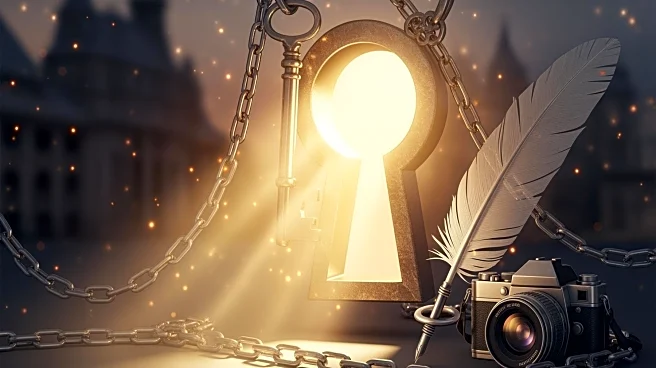What's Happening?
The European Union has awarded its prestigious Sakharov Prize for human rights to two journalists currently imprisoned in Belarus and Georgia. Andrzej Poczobut, a correspondent for the Polish newspaper
Gazeta Wyborcza, is serving an eight-year sentence in Belarus for allegedly harming national security. Mzia Amaghlobeli, a founder of independent media outlets in Georgia, was sentenced to two years for slapping a police chief during a protest. The award, announced by European Parliament President Roberta Metsola, recognizes their courage and symbolizes the struggle for freedom and democracy. The Sakharov Prize, named after Soviet dissident Andrei Sakharov, honors individuals or groups defending human rights and basic freedoms.
Why It's Important?
The recognition of these journalists highlights ongoing challenges to press freedom and human rights in Belarus and Georgia. The award serves as a powerful gesture of solidarity with those fighting for freedom and democracy in these regions. It underscores the EU's commitment to supporting human rights defenders and may influence international pressure on the governments of Belarus and Georgia to reconsider their stance on media freedom. The award also draws attention to the broader issue of political repression in these countries, potentially encouraging further international advocacy and support for imprisoned journalists.
What's Next?
The Sakharov Prize will be presented in December at the European Parliament in Strasbourg. The award may increase international scrutiny on Belarus and Georgia, potentially leading to diplomatic efforts to secure the release of the journalists. Human rights groups and media organizations are likely to continue advocating for their freedom, using the award as leverage to highlight the importance of press freedom. The recognition may also inspire other journalists and activists in repressive regimes to continue their work despite the risks.
Beyond the Headlines
The award raises ethical questions about the role of journalism in authoritarian regimes and the risks faced by journalists who challenge government narratives. It highlights the importance of international support for press freedom and the need for global solidarity in defending human rights. The recognition of these journalists may encourage a broader discussion on the protection of media workers and the need for stronger international mechanisms to safeguard their rights.









